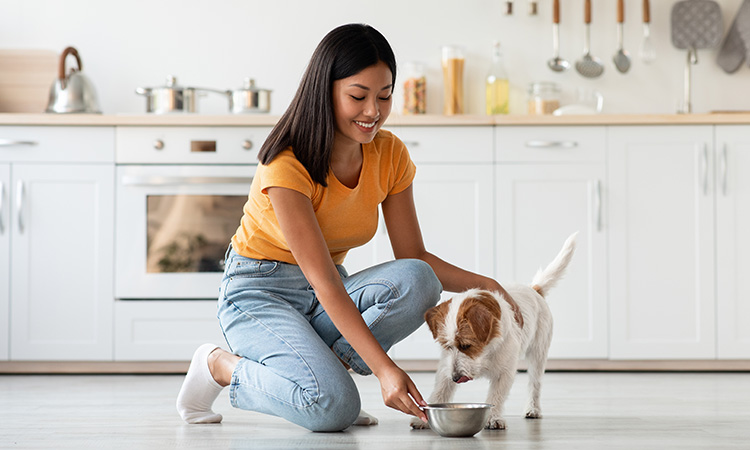Human Foods That Are Safe for Dogs
Human Foods That Are Safe for Dogs

As dog parents, it’s impossible to not share your favorite snacks with your furry friend. But those puppy eyes shouldn’t convince you to share your foods and snacks before understanding which people’s foods are safe for dogs as our digestive systems are very different from theirs. Knowing which human foods are safe for dogs is crucial to keeping them healthy and happy. While some people's foods are healthy and nutritious when consumed in moderation, others can be harmful. Let’s dive into a variety of safe human foods for dogs and their benefits.
Fruits and Vegetables
1. Apples
Apples are a great source of vitamins A and C, making them a fantastic snack for dogs. They also provide dietary fiber, which aids digestion. Just be sure to remove the seeds and core, as they can be harmful to dogs.
2. Blueberries
Packed with antioxidants and fiber, blueberries are a superfood for both humans and dogs. They’re especially beneficial for senior dogs, helping to fight free radicals and support overall health. You can feed your dog blueberries as a low-calorie treat.
3. Carrots
Carrots are an excellent low-calorie snack that’s full of fiber and vitamin A, which supports healthy skin, coat, and eyes. Dogs love chewing on raw carrots, which also helps clean their teeth.
4. Pumpkin
Pumpkin is a highly nutritious food for dogs. Rich in antioxidants and fiber, it supports digestion and can help with constipation or diarrhea. Make sure to offer plain cooked or canned pumpkin without added spices or sugar.
5. Sweet Potatoes
Sweet potatoes are rich in beta-carotene, vitamin A, and fiber, all of which promote a healthy immune system and digestion. Be sure to cook them properly and avoid seasoning.
Proteins
1. Chicken
Plain, cooked chicken is a favorite for dogs and a great source of lean protein. However, avoid giving them seasoned or fried chicken, as spices and oils can be harmful. Always remove bones, as they can splinter and cause injuries.
2. Eggs
Eggs are an excellent source of protein for dogs and can be scrambled or hard-boiled. Make sure they’re fully cooked, as raw eggs can carry salmonella, which can be harmful to both you and your pet.
3. Salmon
Cooked salmon is another great source of protein, packed with omega-3 fatty acids that help maintain a healthy coat and skin. Avoid giving your dog raw salmon, which can contain harmful bacteria and parasites.
4. Turkey
Turkey is a lean, protein-rich option that’s often included in commercial dog food. Just like with chicken, avoid giving your dog seasoned or fatty cuts of turkey, and never feed them the bones.
Grains and Other Carbohydrates
1. Rice
White rice is easy to digest and is often recommended for dogs with upset stomachs. It provides quick energy and is often paired with boiled chicken to create a simple, bland meal that’s gentle on the digestive system.
2. Oatmeal
Oatmeal is a great source of fiber, especially for dogs with irregular bowel movements. Make sure to cook it without any added sugars or flavorings.
Dairy
1. Yogurt
Plain, unsweetened yogurt can be a healthy treat for dogs, as it contains calcium and probiotics that can promote gut health. However, if your dog is lactose intolerant, it’s best to avoid dairy altogether.
Snacks
1. Peanut Butter
Peanut butter is a favorite among dogs and can be a great training treat. However, it must be free of xylitol, a sweetener toxic to dogs. Choose natural peanut butter with no added sugar or salt.
2. Popcorn
Plain, air-popped popcorn can be a healthy, low-calorie treat for dogs. Avoid buttered or salted popcorn, as it contains unhealthy fats and sodium.
3. Coconut
Coconut, especially coconut oil, is a popular ingredient in dog treats due to its benefits for skin and coat health. Just make sure to avoid the hard shell and offer it in moderation.
Foods to Avoid
While many human foods are safe for dogs, others can be toxic and should be avoided at all costs.
These include:
• Chocolate
• Onions and garlic
• Grapes and raisins
• Avocado
• Alcohol
Feeding your dog human food is fine in moderation, but it’s essential to do your research to ensure you aren’t unknowingly giving them something harmful. Incorporating a variety of safe, nutritious options can enhance their health and overall well-being. Alongside a balanced diet, you may want to consider dog insurance or pet insurance to cover unexpected medical costs in case your pet accidentally consumes something harmful.
Conclusion
Treating your dog to the occasional human food can be a fun way to bond, but it’s important to know which foods are safe. Stick to the healthy options listed above and always serve them in moderation. If you ever have any doubts about what’s safe for your dog to eat, consult your veterinarian for guidance.
Disclaimer The above information is for illustrative purposes only. For more details, please refer to policy wordings and prospectus before concluding the sales.










 Health Insurance
Health Insurance  Travel Insurance
Travel Insurance  Car Insurance
Car Insurance  Cyber Insurance
Cyber Insurance  Critical Illness Insurance
Critical Illness Insurance
 Pet Insurance
Pet Insurance
 Bike/Two Wheeler Insurance
Bike/Two Wheeler Insurance  Home Insurance
Home Insurance  Third Party Vehicle Ins.
Third Party Vehicle Ins.  Tractor Insurance
Tractor Insurance  Goods Carrying Vehicle Ins.
Goods Carrying Vehicle Ins.  Passenger Carrying Vehicle Ins.
Passenger Carrying Vehicle Ins.  Compulsory Personal Accident Insurance
Compulsory Personal Accident Insurance  Travel Insurance
Travel Insurance  Rural
Rural 











